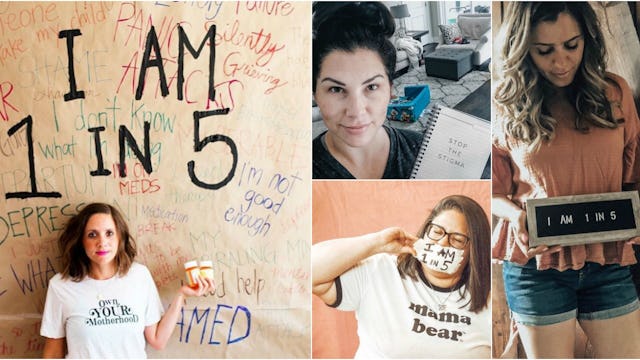How The #Iam1in5 Series Seeks To Break The Stigma About Mental Illness

Researchers estimate as many as 1 in 5 adults experience mental illness in any given year, and that nearly 1 in 7 women will experience a serious mood disorder after having a baby (this is regardless of whether they’ve been diagnosed with a mental health issue prior). Postpartum mental health issues – including depression, anxiety, OCD, and PTSD – are so common. Yet, so few of us talk about this fact.
But silence creates shame and stigma. And the more we keep things to ourselves, the less likely we – or our fellow moms – will reach out and get help. And listen up: this is not something any of us can afford to take lightly. Let me hit you with one more stat: suicide is the second leading cause of death among postpartum women, and while it’s a rare enough occurrence, it does account for 20% of postpartum maternal deaths.
These issues are not something any of us can afford to ignore for one more second. And that is why sharing our stories and truths – with each other, on social media, and elsewhere – is so vital. And a new viral series that is doing just that. It’s called #Iam1in5 – and let me tell you, it’s absolutely inspiring and empowering.
I am seriously blown away by the women participating in this series — their beauty, their raw, wise words, and their willingness to put themselves out there. They are not just doing this to share their own stories – but in the hopes that doing so will de-stigmatize postpartum mood disorders, and maybe even bring some light, solace, and strength their fellow moms.
Because if you think about it, mental illness itself makes it hard enough to seek help for, but if guilt, shame, and embarrassment are part of the picture too, it’s almost impossible to get better.
“I remember being pregnant and thinking there was no way I would get postpartum depression,” writes Meg Boggs, a blogger and mom to baby, Maci. But then, when her daughter was born, she found herself sinking deeply into a depression that she couldn’t pull herself out of.
“The harder I fought, the more I sank,” she writes. “So I went silent. I pretended like I was okay. I let the stigma surrounding mental health win and tape my mouth shut.”
“But no more,” Boggs proclaims.
YES. These women are breaking the silence on postpartum mental health issues, and doing so proudly, loudly, and with grace. It’s about time.
The #IAm1in5 series was started by blogger Desiree Fortin, who tells Scary Mommy that she began battling serious depression soon after her triplets were born. She shares in her IG post that it took weeks for her to actually seek help for the depression, and that is part of why she started this series – to assure mothers that this is more common than they realize, and that help is out there.
“I wanted to remind people that they are not alone in their struggles of mental health,” she tells Scary Mommy. “Vulnerability is what connects us as humans and sometimes it means talking about hard things and mental health is hard to talk about, but it is also so freeing when you do.”
In addition to bringing awareness to the issue, these mothers are also seeking to reduce the shame surrounding the issue of taking medication for mental health issues.
After giving birth to her third child this year, Brittany, a blogger from Houston, describes the depression that she spiraled into: “I knew something was off because I wasn’t able to breastfeed and I found myself crying all the time, I didn’t want to get out of bed, I didn’t want to hold Leighton that much, and I knew I wasn’t myself,” she writes in her #Iam1in5 post.
With the encouragement of her friends (2 of whom are a part of the #Iam1in5 series), Brittany went to her doctor, who prescribed Prozac. “[M]y life has changed tremendously,” she shares. “I am a new person on medication and I don’t know where I’d be or what I would’ve done without meds and the support of my husband and friends.”
But going on the meds wasn’t an easy choice, mostly because Brittany felt bombarded by the fear and shame that so many of experience when faced with the prospect of taking medication for mental health issues.
“[B]efore I was on meds I was so embarrassed to get on meds and thought I’d be a failure,” she writes. “[B]ut it was the best decision.”
Obviously, medication isn’t the answer for every mother battling a postpartum mood disorders – but my goodness, medication works very well for so many moms, and the last thing anyone needs is any more guilt, amiright? This kind of thing need to stop, and it needs to stop now.
So thank you to these gorgeous, badass women who are doing their part to break the silence and remove the stigma. Speaking out is such an important step, and will give comfort to so many moms, and hopefully get them much-needed help.
Of course, there is more work to be done to make mental health services more accessible and to improve treatment for postpartum mental health disorders. But every step forward is incredible, and these women are true heroes for opening up, taking the risk, and sharing their stories with all of us.